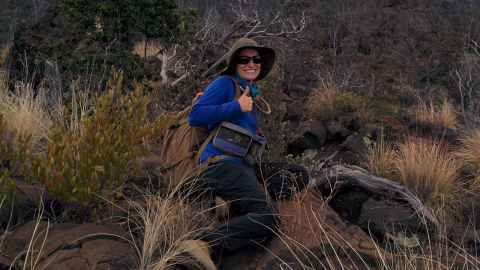Field and laboratory technician
Sophie Miller completed a Master of Arts in Anthropology and is now an archaeologist with the International Archaeological Research Institute in Honolulu, Hawai'i.

Key facts
Career: Field and laboratory technician
Programme: Master of Arts
Subject: Anthropology
"I work as an archaeologist for the International Archaeological Research Institute, based out of Honolulu, Hawai'i. I work with a great team of fellow archaeologists who conduct research and field work throughout the greater Pacific and Asia.
"As a field and lab technician, my job is to travel to these places and work out in the environment surveying and observing for historic and pre-historic cultural material and landscape features, conducting excavations and mapping, and completing laboratory analyses.
My Arts degree has taken me many places, both inside New Zealand and around the world.
"Currently, I'm in the middle of a long-term project on the Big Island of Hawai'i, surveying for archaeological sites and features on a volcanic landscape.
"A lot of the work I do involves monitoring, survey and processing cultural material. When construction work is planned in Hawai'i, archaeologists are often needed to monitor any subsurface excavation in an area where there might be cultural material.
"If it is an area of known archaeological value, an inventory survey may be undertaken with test pits and other controlled excavations, to determine the nature of the site and to evaluate whether mitigation measures are required. Once material has been collected, it is then taken back to the lab for analysis so that we can report back on our findings.
"Every day is a new challenge; you have to be constantly on the look-out for signs of human modification to the landscape while you work. You learn to develop an eye for staring at the ground while you walk just in case there may be some artefact or hidden treasure just below your feet.
"One of the things I enjoy about working in archaeology is that I can truly say I get paid to do what I love and to travel all across the world. I get to see parts of the islands that are closed to many others. This is one of the best parts of being an archaeologist: you get to see the past, and the landscape, in very different ways.
"I first decided to be an archaeologist when I learned that places like the Lascaux Caves may be closed off to the public. I wanted to be able to have access to those key places from history and human past.
Studying Arts allowed me to learn about the different cultures that I work around today.
"I learned to problem solve in creative ways, and to evaluate all angles of an issue. In short, I learned to be an archaeologist.
"The postgraduate work I did, as well as the connections and friends I made, have been valuable in my working life. I was able to accumulate many different experiences: working in a laboratory, teaching students, and the ability to work hard but also think my way around a problem.
"University is a place for you to form valuable connections with people in the archaeological community, and there are great opportunities for following an archaeological career path within the Faculty of Arts.
"An Arts degree can give you an advantage over other degrees as it encourages creative thinking. You may change from where you begin your studies, but that is the beauty of an Arts degree: it is flexible, changeable and allows you to truly find the area that you want to pursue, even if it may surprise you."